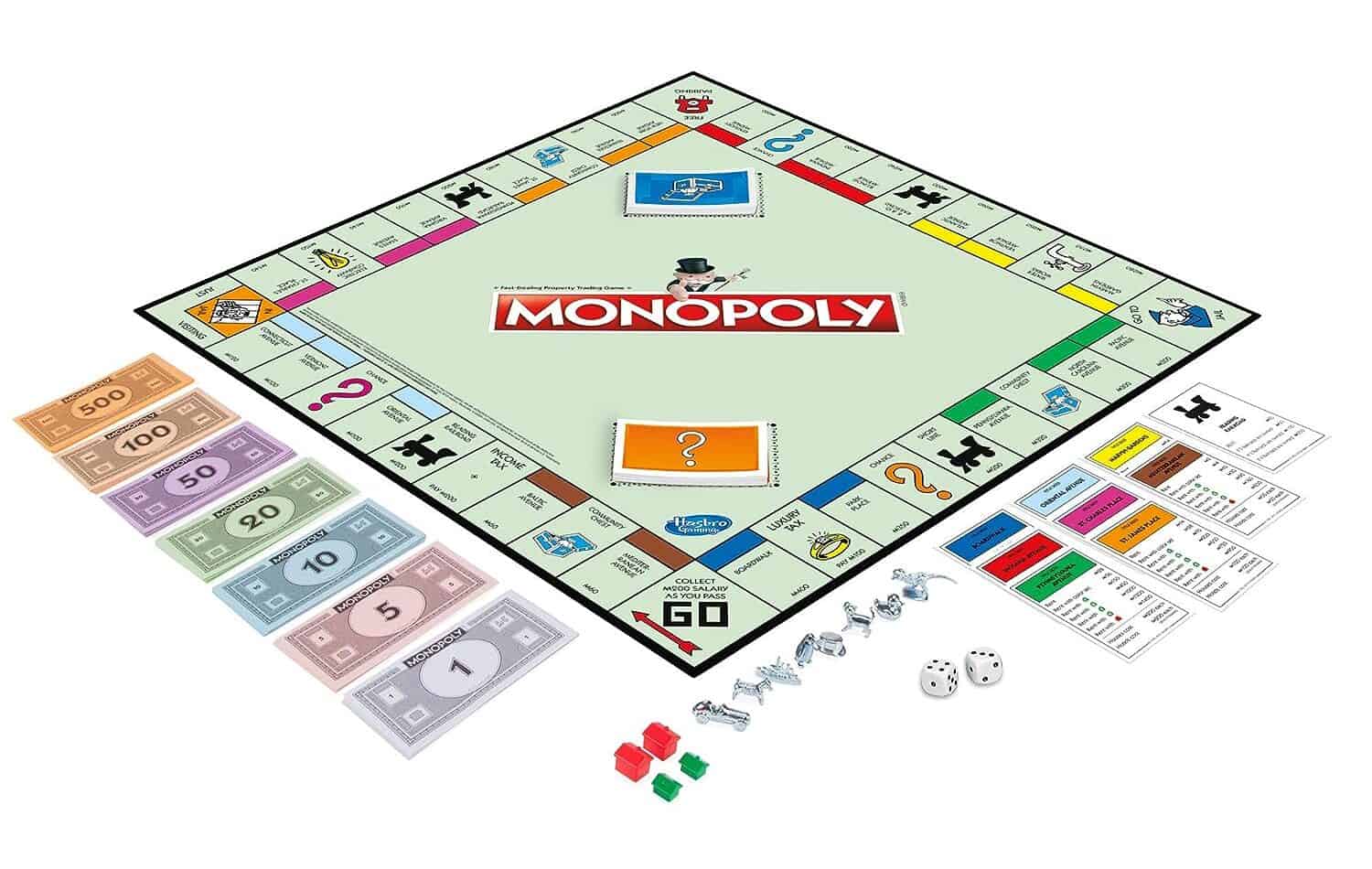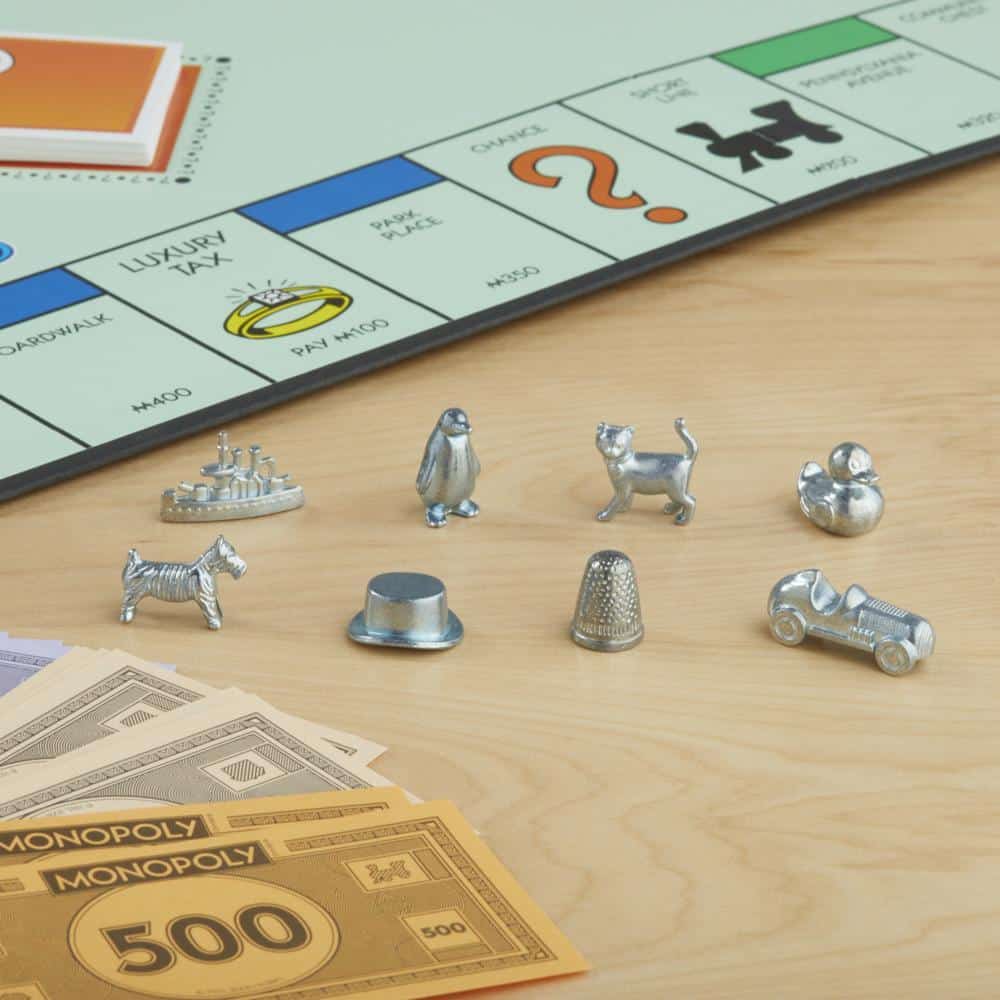Monopoly is like a rollercoaster ride through the ups and downs of property ownership, where you’ll wheel and deal your way to real estate glory or end up bankrupt and consoling yourself with imaginary piles of colorful money.
It’s the game where you can proudly say, “I’m a real estate tycoon!” while realizing that the only real estate you own is Baltic Avenue with a lonely hotel made of toothpicks. But hey, you’re the proud landlord of a slightly damp cardboard square.
Monopoly teaches you the art of negotiation, strategic planning, and the fine art of auctioning off properties while praying your siblings don’t bankrupt you with a crippling hotel chain on Boardwalk. And let’s not forget the thrill of passing “Go” and collecting $200, which, let’s face it, feels like winning the lottery.
So, grab your tiny shoe or top hat, and get ready for a real estate adventure that will make you question the value of a thimble, wonder why anyone would pay rent on Reading Railroad, and seriously consider a career as a professional banker.
What’s Included in Monopoly?
- 1 Game board
- Tokens (e.g., car, shoe, dog, hat, etc.)
- Play money (Monopoly money)
- Property cards
- Chance and Community Chest cards
- Houses and hotels
- Dice (2 standard six-sided dice)
How to Play Monopoly
Player count and game length
The standard Monopoly board game is designed for 2 to 8 players. However, it’s worth noting that the game can be played with just two players, but it’s often more enjoyable with more people. With fewer players, there is less competition for properties, and the game can progress more slowly.
The duration of a game of Monopoly can vary significantly depending on several factors, including the number of players, their experience level, and house rules. On average, a standard game of Monopoly can last anywhere from 1 to 4 hours or even longer.
Setup
Here’s how to setup a game of monopoly:
- Lay out the game board in the center of the table.
- Each player selects a token and places it on the “Go” space.
- Shuffle the Chance and Community Chest cards and place them on their respective spaces on the board.
- Place all property cards face down, shuffle them, and then place them face down on their corresponding spaces.
- Each player receives an equal amount of Monopoly money (e.g., $1500 in various denominations).
- Choose a banker. This player is responsible for handling all transactions and property management.

Monopoly Rules
- Players take turns clockwise.
- Roll both dice and move your token forward the total number of spaces rolled. Follow the instructions on the space where you land.
- Property: If you land on an unowned property, you can choose to buy it for the listed price. If not, it goes up for auction.
- Owned Property: If you land on a property owned by another player, pay the rent specified on the property card.
- Chance and Community Chest: Draw a card and follow its instructions.
- Income Tax/Luxury Tax: Pay the specified amount to the bank.
- Go to Jail: If you land on “Go to Jail” or draw a card that instructs you to, move your token to the Jail space. You can get out by rolling doubles, using a “Get Out of Jail Free” card, or paying a $50 fine.
- Free Parking: No action required.
- After moving, you can choose to buy properties, develop your properties with houses and hotels, trade with other players, or mortgage properties to raise money.
- The game continues with players taking turns until one player bankrupts all others or until the players decide to end the game based on predetermined rules.
These are the basic rules of Monopoly. Keep in mind that there are many variations, house rules, and special editions of the game, so it’s a good idea to clarify any specific rules or variations you want to use before starting a game.
For the official rules from the creator, Hasbro, see the links below:
- Monopoly Board (1997) Game Rules
- Monopoly Board (1999) Game Rules
- Monopoly Board (2003) Game Rules
- Monopoly Board (2007) Game Rules
- Monopoly Here and Now Board Game Rules
- Monopoly Here and Now Electronic Banking Edition Game Rules
- Monopoly Jr. Board Game Rules
- Monopoly Jr. Travel Board Game Rules
How to win Monopoly
The last player remaining, who has not gone bankrupt, is the winner of Monopoly.

Winning the Monopoly board game requires a combination of strategy, negotiation, and luck. Here are some tips to help you increase your chances of winning:
- Acquire Property: Early in the game, focus on buying as many properties as you can. Aim for complete color sets because owning all properties within a set allows you to build houses and hotels, which significantly increase the rent other players must pay when they land on your properties.
- Strategic Property Development: Once you own a complete color set, prioritize building houses and eventually hotels on those properties. Be mindful of your cash flow; you want to have enough money on hand to pay rent and make strategic investments.
- Trading: Negotiation is a crucial aspect of Monopoly. Look for opportunities to trade with other players to complete color sets or acquire properties that complement your existing ones. Be prepared to make fair offers, but also be on the lookout for advantageous trades.
- Cash Management: Carefully manage your money. Avoid overextending yourself with property purchases and development if it leaves you with too little cash to pay rent or other expenses. Mortgaging properties can provide quick cash in emergencies, but it comes at the cost of losing rental income from mortgaged properties.
- Monopolize Utilities and Railroads: Owning all the utilities (Electric Company and Water Works) or all the railroads can be profitable. The rent for these properties increases significantly with development, making them good long-term investments.
- Be Strategic in Jail: Being in jail isn’t always a bad thing. It keeps you safe from landing on opponents’ developed properties and allows you to avoid undesirable spaces. Consider staying in jail to avoid certain property groups or to increase your chances of landing on your own properties.
- Auctions: If you choose not to buy a property you land on, it goes up for auction. Take advantage of auctions to acquire properties at lower prices than the initial listing.
- Watch Your Opponents: Pay attention to your opponents’ financial situations and property ownership. Try to anticipate their moves and make deals that benefit you while disrupting their strategies.
- Upgrade Wisely: Focus on upgrading properties that are likely to be frequently landed on by opponents. Upgrading evenly across color sets is usually a good strategy, but prioritize those with higher rent potential.
- Stay in the Game: Even if you’re not doing well financially, don’t give up too early. Monopoly is a game of swings, and you can bounce back with a few good rolls, smart trades, or by landing on valuable properties owned by opponents.
- Endgame Strategy: As the game progresses and players start to run low on cash or properties become scarce, consider making deals that consolidate your position or secure a monopoly on a valuable property group.
Remember that Monopoly involves an element of luck with dice rolls and card draws, so winning isn’t guaranteed. Nevertheless, by employing sound strategies, making savvy deals, and managing your resources effectively, you can increase your chances of emerging victorious in the game.